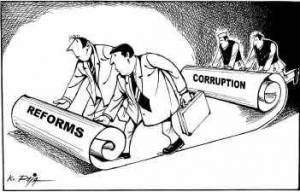Nothing to say about Ukraine’s National Anti-Corruption Committee

Mykola Khavonyuk from the Institute for Legal and Political Reform writes that there have been various anti-corruption bodies since 1993.
In February 2010 the newly elected President Yanukovych issued a decree creating a National Anti-Corruption Committee. This was to be a consultative advisory body under the President.
The Executive Secretary of the Committee – the Justice Minister – was instructed to prepare without delay proposals on making comprehensive and systematic amendments to the Law on the Principles for Preventing and Countering Corruption, the Law on Liability of Legal Entities for Corruption Offences, and other legislative acts designating liability.
On 22 April 2010 the first meeting took place of this National Anti-Corruption Committee with almost all the members (appointed by the President) present. The meeting identified the need for two strategies – a single anti-corruption strategy for the whole country, and strategy for the work of the Committee.
From 2010-2011 the makeup of the Committee changed on many occasions
On 1 September 2011 a Presidential Decree passed Provisions on the National Anti-Corruption Committee, with these at long last stipulating its basic tasks, duties and rights.
On 16 March 2012 amendments were made to these Provisions according to which the Executive Secretary was no longer the Justice Minister, but the Secretary of the National Security and Defence Council. This Council’s office was also made responsible for technical backup for the Committee while the National Institute for Strategic Studies was made responsible for scientific accompaniment and for the work of the working groups which it created.
That same day a new makeup of the Committee was established with this including, as well as the Chair and his Executive Secretary another 22 public officials, as well as another four officials with a academic profile; three MPs; and one representative of a civic organization.
Mykola Khavronyuk writes that by 30 May 2012 the main objectives of the Committee had changed considerably, though the only addition which is not about preparing propositions, etc, seems to be No. 6 Promoting implementation of recommendations from GRECO and other leading international anti-corruption organizations, and raising the effectiveness of international cooperation in this sphere.
Yet another Decree from 12 October 2012 made new amendments, stipulating, for example, which public officials were to be on the Committee.
The Decree also stipulated that at least one fifth of the members of the Committee should be from civic organizations. This has yet to be done, and as reported, the one representative of a civic organization – Oleksy Khmara from TORO, Transparency International’s partner in Ukraine, left in August 2012. This was mainly in protest at the President’s signing of Law № 9634 on Amendments to Some Legislative Acts on Public Procurement which not only Mr Khmara considered to be a law increasing corruption.
Mykola Khavronyuk is no more impressed. He asks what one can say about the Committee’s success in preventing and countering corruption, and answers most succinctly: Nothing.
Picture from here
Very much abridged from an article here: http://pravo.org.ua/209-slaider-novyn/1278-natsionalnyi-antykoruptsiinyi-komitet-dlia-choho-vin-potriben.html





